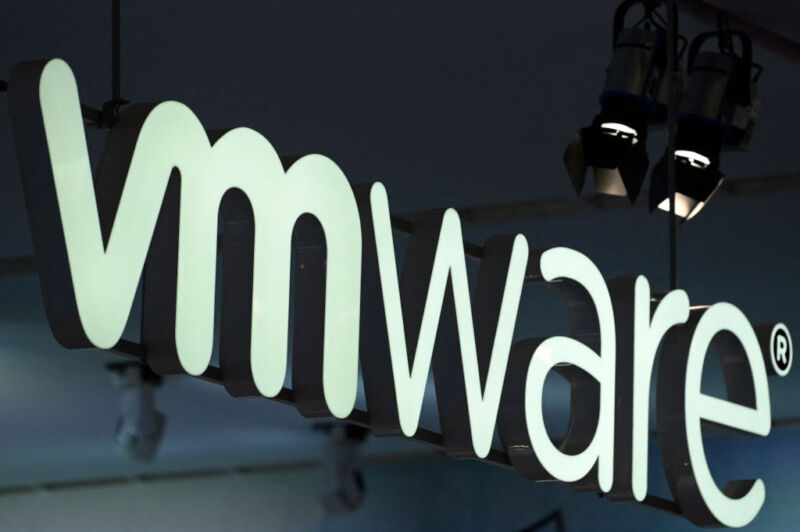Legal dispute continues —
Broadcom “preventing some vendors from selling products to us,” AT&T alleges.

Broadcom quoted AT&T a 1,050 percent price hike for VMware offerings, AT&T has claimed in legal documents.
AT&T sued Broadcom on August 29, accusing Broadcom of unlawfully denying it the second of three one-year renewals for support services that AT&T thinks it’s entitled to. AT&T cites a contract signed before Broadcom bought VMware. The telecommunications firm says it has 75,000 virtual machines (VMs) across approximately 8,600 servers running on VMware. Broadcom, which has stopped selling VMware perpetual licenses, has said that AT&T missed its opportunity to renew support and that the contract between VMware and AT&T has an “End of Availability” provision allowing VMware to retire products and services.
Legal filings from September 27 and spotted by The Register today show an email [PDF] that AT&T EVP and GM of wireline transformation and global supply chain Susan A. Johnson apparently sent to Broadcom CEO Hock Tan pointing to “an impasse” over VMware.
Johnson argued in the email that AT&T should have the right to renew support through September 2026 thanks to a previously signed five-year deal:
This proposed annual increase of +1,050% in one year is extreme and certainly not how we expect strategic partners to engage in doing business with AT&T.
A 1,050 percent price hike is the largest that Ars Technica has heard of being proposed by Broadcom. At this time, it’s unknown if AT&T’s claims are accurate. Broadcom hasn’t publicly commented on the allegations.
Many VMware customers have pointed to VMware becoming more expensive under Broadcom, though. Broadcom’s changes to selling VMware have reportedly included bundling products into only about two SKUs and higher CPU core requirements. In March, customers reportedly complained about price increases of up to 600 percent, per The Register. And in February, ServeTheHome said small cloud service providers reported prices increasing tenfold.
AT&T’s contract with VMware may be one of the firm’s bigger accounts. A 1,050 percent price hike would be another level, however, even for a company the size of AT&T. Per Johnson’s email, AT&T and Broadcom have had a “strategic relationship” for over a decade.
The email reads:
… AT&T has decided to pursue a legal strategy along with a disciplined plan to invest to migrate away, all of which will quickly become public. I truly wish we had another option. Unfortunately, this decision will impact the future of our overall relationship and how we manage spend in other Broadcom areas.
AT&T on potentially migrating off VMware
In her email, Johnson points to migration costs as impacting how much AT&T is willing to pay for VMware.
According to the message, projected costs for moving AT&T off of VMware are $40 million to $50 million. AT&T is said to use VMware-based VMs for customer services operations and for operations management efficiency. Per AT&T’s email, migration “has a very quick payback” and “strong” internal rate of return, “especially given the high licensing costs proposed.”
On September 20, Broadcom requested that AT&T’s request to block Broadcom from discontinuing VMware support be denied. In legal documents [PDF], Broadcom said that AT&T is planning to ditch VMware and that AT&T could have spent “the last several months or even years” making the transition.
In an affidavit filed on September 27 [PDF], Johnson stated that her email to Tan does not suggest that migration “would be easy, quick, or inexpensive” and that “none of those would be accurate statements.”
“My point was that although it is not easy, cheap, or quick to migrate off VMware, Defendants’ high fees will incentivize us to migrate to another solution,” the affidavit reads.
Johnson also claimed that AT&T started exploring options for getting off VMware in December but thought that it had time to make decisions, since it believed it could opt to renew support for its licenses until September 2026.
In another legal filing from September 27 [PDF], Gordon Mansfield, president of global technology planning at AT&T Services, says:
AT&T currently estimates it will take a period of years to transition all of its servers currently operating with the VMware software away from VMware. Moreover, Defendants have not made it easy to do so since we understand that they are preventing some vendors from selling certain products to us.
The filing didn’t get into further detail about how exactly Broadcom could be blocking product sales to AT&T. Broadcom hasn’t publicly responded to Mansfield’s claim.
Regarding AT&T’s lawsuit, Broadcom has previously told Ars Technica that it “strongly disagrees with the allegations and is confident we will prevail in the legal process.”
Since Broadcom’s VMware acquisition, most customers are expected to have at least considered ditching VMware. However, moving can be challenging and costly as some IT environments are heavily dependent on VMware. Being able to ensure that things are able to run as expected during the transition period has also complicated potential migrations.
While AT&T and Broadcom’s legal dispute continues, Broadcom has agreed to continue providing AT&T with VMware support until October 9. A preliminary injunction hearing is scheduled for October 15.